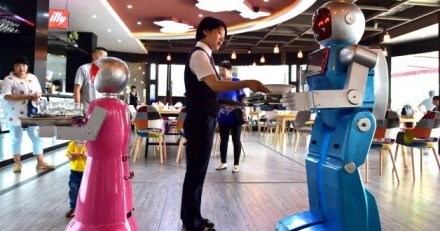A company located in a high-tech industrial park in Shenzhen, Guangdong Province, is aiming to bring big changes to the world by enabling machines to have perceptions similar to human, by making use of 3-D sensing and artificial intelligence (AI) technologies, China Daily reported.
"Robots, drones, smartphones and any other hardware that has a camera will be able to display three-dimensional images of what we see and also mimic us," Huang Yuanhao, founder and chief executive officer of Shenzhen Orbbec Co. Ltd., said.
According to the 36-year-old entrepreneur, most of the pictures captured by cameras are flat images, or two-dimensional images and the "distance" indicator is not shown, which causes limitations to the application of smart devices. "Robot cleaners, for example, will not be able to identify obstacles lying a few meters away and avoid them," Huang added.
Huang believes that there is a huge market for 3-D sensing technology as this can be applied in various fields such as photography, fitting, education and entertainment.
"Many IT giants like Microsoft Corp., Intel Corp. and Google Inc. have spotted potential opportunities and stepped into the industry. We can offer better products in this field and compete with those top players," Huang noted.
The report said that Huang's vision could be possible with his decade-old experience in 3-D sensing and his strong team, which consists of talents from leading IT firms including Apple Inc., Huawei Technologies Co. Ltd., Tencent Holdings Ltd. and IBM Corp. In addition, Huang is post-doctoral graduate from Massachusetts Institute of Technology. He founded Orbbec in 2013.
Huang said that the favorable entrepreneurial environment in Shenzhen has also enhanced his company's research and development capabilities.
"There are still many lights on in the building late in the night. That is encouraging. I feel that I am not fighting alone," said Huang. The Shenzhen-headquartered company has branches in Shanghai and the United States.
Orbbec has already received orders worth over 100 million yuan ($15.5 million) since it began mass production of its 3-D sensor two months ago.
The report said that since Premier Li Keqiang visited the Chaihuo Maker Space and encouraged young people to innovate and set up their own business, innovation and entrepreneurship have gained momentum in Shenzhen.
The Shenzhen government has set up a 200-million-yuan special fund to spur at least 50 maker spaces every year and raise the number of makers to 100,000 by 2017.
Ge Guoxing, deputy director of Guangdong provincial department of human resources and social security, said on Friday, Dec. 18, that Guangdong Province will further promote innovation and entrepreneurship and guide social capital to participate in the field.
"The province plans to nurture 50,000 university graduates to become entrepreneurs within four years and provide support for returnees to set up their companies," Ge said, adding that other entrepreneurs like veterans or people with job-hunting difficulties can also avail of government subsidies.



























